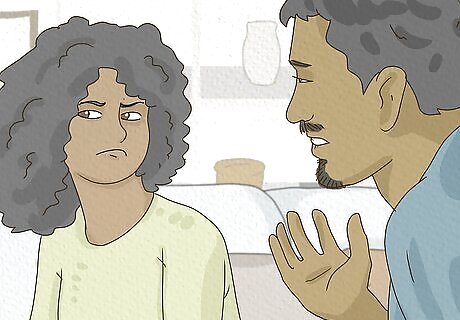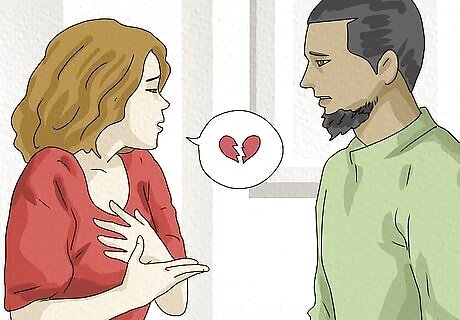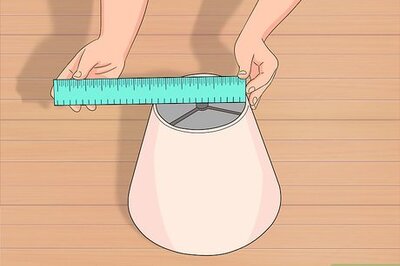
views
- Your wife may resent you if she feels neglected, or she may feel like she’s been forced to take on too many responsibilities without any support from you.
- However, it’s also possible your wife might only seem to hate you because she’s stressed about something else or depressed.
- Discuss the situation with her and listen attentively to determine what’s wrong. Focus on meeting her needs and spending quality time together.
Signs Your Wife May Hate You

She refuses to talk or confide in you. Lack of communication usually signals trouble in a relationship. Something is likely upsetting her if your wife only gives one-word answers or actively ignores you when you talk to her. Additionally, if she doesn’t make time to tell you about her day, tell you how she’s feeling, or confide in you, it may be because she resents you. For example, if you ask her about your day and she says “Fine” before dropping the conversation, that might indicate something is wrong.

You fight all the time. Does it feel like everything you say turns into an argument or that your wife only has negative things to say? Do you typically end up fighting over really minor issues that didn’t use to bother either of you? Something may be wrong if your wife loses her temper with you more often than she calmly talks to you.

She has no time for you and actively avoids you. If your wife is giving you the cold shoulder, she might be trying to signal her resentment without coming out and saying it. When you walk into a room, does she leave? Does it feel like she purposefully works more hours or hangs out with friends rather than spending time with you? If your wife is avoiding you, it may be a sign of trouble in your marriage. Quality time is important for couples—it builds intimacy and facilitates romance! So, take notice if she isn’t interested in it anymore. She might even avoid eye contact with you or look away when you try to meet her eyes.

There’s no intimacy between you. Does she tell you she’s not interested in sex or doesn’t feel like it most of the time? Does she pull away when you try to touch her? Physical intimacy is often an important way that couples express love and affection for one another—so take note if she’s not interested in sex anymore but doesn’t really give you a concrete reason.

She flirts with other people in front of you. If your wife really wants you to know that something is wrong, she might get openly flirty with people who aren’t you—and seem totally unconcerned if you notice it. She might also put more effort into dressing up when she’s going out with friends but make zero effort when she’s around you, which may hint that her priorities have changed. Remember—flirting doesn’t necessarily mean she’s having an affair, although it’s understandably hurtful to see nonetheless. Try not to panic and discuss the issue with her calmly instead.

It’s stressful to be around her. Does it feel like you’re walking on eggshells around her all the time? Are you afraid to say or do the wrong thing because it might make her upset? It’s naturally really stressful to be around someone who acts as though they don’t like you, which is why it’s a definite warning sign if you notice that you get tense and anxious whenever you spend time around your wife.

She doesn’t seem to care about you. Does your wife still ask about your day or express concern when you feel unwell? If she resents you, she might not. Loving couples care for one another a great deal—but if she doesn’t feel the same about you anymore, she might seem much more distant and aloof. She also may not offer to help you when you’re struggling or feeling under the weather. For example, if you have a cold and she shrugs it off, telling you to run to the store for medicine on your own, it may be a sign of resentment.

She’s emotionally manipulative and controlling. Your wife may resort to emotional manipulation if she truly has negative feelings toward you. Controlling behavior can take several forms: for example, she might blame you whenever she’s upset about something or feeling unhappy, try to manipulate you by insinuating that you should feel guilty for your behavior, or play the victim when something goes wrong. For example, she might try to blame you by saying, “Maybe I’d be happier if you’d done things differently,” or “You should’ve taken care of this weeks ago, but now you’ve made it worse.” Alternatively, if she does something hurtful—like throwing out a meaningful possession of yours—and then gets upset when you try to confront her, she might be intentionally playing the victim to throw off your anger.

She teaches your kids to have contempt for you. If you have children together, you may notice that she sometimes pits them against you by telling them about the shortcomings she thinks you have. For example, she might tell them you’re untrustworthy if she feels betrayed or lazy if she feels like you don’t do enough around the house. As a result, your kids might start to resent you in turn. Not only is this behavior unfair to you, but it’s also unfair to your kids. They need emotionally mature parents—which means any complaints she has should be discussed between you and your wife, not between her and them.

She plans financially without your input. Money can be a big source of conflict for any relationship, and different couples have their own approach to handling finances. Some combine all their finances, and others partially merge their funds while keeping some separate as well. Your wife managing her own money isn’t an issue, but it may become one if she starts making decisions about your joint funds and spending or investing it without consulting you.

She’s extremely critical and intentionally hurtful. Does it feel like everything you do annoys her? Does it seem like she criticizes you for every little thing you do? Furthermore, does it feel like all her criticism isn’t constructive at all but rather intended to make you feel humiliated and bad about yourself? If your wife resents you, she might start calling out innocent mistakes or comparing you to other people. For example, she might say critical things like, “You did that wrong. You can’t do anything right,” or comparative statements such as, “If my friend Alex were doing that, it would’ve been done right.”

She’s verbally abusive toward you. Verbal abuse is essentially a type of bullying, and it can take a lot of different forms. Blaming and criticism can be part of that, but verbal abuse also includes unkind name-calling, ridicule, humiliation, and threats. In other words, if your wife resents you, she may start hurling insults at you without any provocation—likely to get back at you for whatever she’s really upset about deep down. She may also insult you or lie about you behind your back to family or mutual friends—which isn’t fair to you. Spouses should be able to trust one another, after all. No matter how your wife feels about you, verbal abuse is absolutely unacceptable. Take care of yourself, and don’t be afraid to take a step back or ask for a separation if necessary. Your emotional well-being is important.

She barely argues with you anymore. As mentioned above, constant conflict is a sign of resentment in a marriage, but if your wife suddenly stops arguing with you altogether, it may also be a warning sign. Whereas before you fought often, you may notice that it becomes hard to get any kind of emotional reaction out of your wife at all as she becomes indifferent rather than argumentative.

She outright says she doesn’t love you. If your wife has truly fallen out of love, she may tell you as much. It’s possible that she may still be willing to work on the marriage and try to rekindle those feelings, or she might make up her mind to end the relationship. No matter how difficult it may be, love can’t (and shouldn’t) be forced—so if she really feels that way, the best thing for you to do is sit down and figure out what comes next together. Remember that both of you deserve to be with someone who loves you. Neither of you should stay in a loveless marriage when you could either work to improve it or move on to something new.
Reasons Your Wife is Acting Like She Hates You

She may feel like you’ve both become complacent. Sometimes, achieving the goals you set out to fulfill at the beginning of the marriage—like buying a house or raising kids—can cause complacency. Things may start to feel tiring, boring, or repetitive between you and your wife—and if she still has dreams and goals for her life, this can also cause her to feel frustrated with you, even if you try to be a supportive spouse. If you think this might be the reason your wife’s behavior has changed, ask her about her dreams and what she wants to do next in life. She may have an answer locked and loaded! Complacency happens to a lot of couples, and it doesn’t mean your marriage is over—it may simply be best for the two of you to discuss ways to make things feel refreshing and fun again or create new goals to achieve together.

She feels like she’s facing the challenges of marriage alone. Between managing careers and incomes, taking care of the home, and potentially caring for kids, marriage comes with many responsibilities—but it’s also a two-way street. Ideally, both spouses tackle their share of the work. However, if your wife feels like she’s been forced to take on too much of that responsibility, she might end up resenting you. For example, if your wife is singlehandedly responsible for working all day, making dinner, taking care of the kids or pets, and doing chores when she gets home, that’s an overwhelming amount to manage—and she may feel like you’re not contributing.

She may feel like you take other peoples’ sides over hers. Outside influences (like family, in-laws, or friends) can really impact a marriage over time. When there’s conflict—between your wife and one of your friends, for example—your wife likely expects you to take her side and may start to resent you if you don’t, or if you refuse to intervene on her behalf. Over time, she may start to feel like you aren’t in her corner (even if you really try to be most of the time). For example, say your mom really wanted to treat you to lunch for your anniversary, but your wife wanted to spend that day with you alone. If you supported your mother’s wishes over your wife’s, that might cause friction between you.

She might be disappointed with you. Many relationships go through a “honeymoon period” early on when feelings are running high, and it may feel more natural to be super romantic with your wife, making grand gestures to impress her. As time passes, relationships often settle down—so if you set a high bar early on but have since lowered it a bit, your wife may be disappointed or feel like you’re not doing enough anymore.

She may feel like you’ve betrayed her or broken promises to her. Before getting married, or at the beginning of your marriage, did you make grand promises about your future together? If those promises haven’t come true yet, she might be angry because she feels like you’ve gone back on your word. Alternatively, if she suspects (or knows about) infidelity, she may resent you because of it. For example, if you promised that the two of you would have kids by a certain age or travel the world together but haven’t thus far, she might feel like you lied to her about those things.

She could be feeling neglected and unappreciated. If you haven’t spent much time together lately, she may feel like she’s not a priority to you anymore. Additionally, she may feel like you don’t acknowledge the caring things she does for you or any of the sacrifices she might make for your marriage—and if she feels like you don’t appreciate her, she may feel bitter and resentful toward you in turn. For example, if your wife agreed to move for you to work a dream job, but you didn’t thank her or try to spend time with her after the move, she likely feels pretty neglected and unappreciated.

She may feel like you don’t listen to her. Many women value emotional intimacy, and communication is vital in any marriage. The key to both is good listening skills! Being a good listener is about trying to understand someone's thoughts and feelings and giving them a safe space to talk. If she feels like you don’t really listen to her when she talks, she might resent you.

She may be upset about something else and projecting her issues. Your wife’s behavior might have nothing to do with you; she might be stressed, angry, or troubled about something else in her life. She may even be upset with herself, but the sense of dissatisfaction she has might be causing her to lash out and project those problems onto you instead. For example, if your wife is having a tough time at work, that might cause her to seem more cold and distant to you—when, in reality, she’s just stressed and preoccupied.

She may be depressed or dealing with personal issues. Many different factors might cause someone to act distant or upset—so there’s a chance your wife may not be angry with you. If she’s always in a bad mood, withdrawn, or feels sad and hopeless often, she may be depressed. If she’s struggling with depression, she likely needs your love and support as she works to manage the condition. The best treatments for depression are often therapy and, if necessary, medication managed by a psychiatrist. Consider encouraging her to seek help from a therapist if she feels like she might be depressed.

She may have fallen out of love. Although it can be painful to deal with, your wife may act cold or resentful because her feelings have changed. Falling out of love doesn’t necessarily mean your wife has been unfaithful or fallen in love with someone else; she may realize she doesn’t feel the way she did at the beginning of your marriage or feel like there’s a disconnect between the two of you. Remember: love may fade, but it’s also absolutely possible to reignite it. If you and your wife are willing to work on the marriage, she may fall in love again; it just takes time.
What to Do If Your Wife Hates You

Discuss the problem and listen to her side of the story attentively. Lack of communication can lead to many problems for a relationship, so make sure you know what’s causing all the negative emotions. Sit down with your wife, tell her that you’ve noticed things are different between you lately, and ask her if there’s something wrong. Hear her out, and actively listen to her to show that you care about her feelings. Give her a safe space to vent. It’s possible she’s not really angry at you and needs to get something off her chest, so don’t get upset before you know what’s happening. Even if the issue concerns you, try not to get angry or defensive. Her feelings are valid, and she needs to express them freely. You’ll have time to respectfully discuss any issues you might have too.

Work on yourself and follow through on your promises. Do you have any toxic traits or habits that may have affected the marriage? After discovering what’s been bothering your wife, reflect on your behavior and determine what you can work on. Commit to making positive changes, and follow through on them. Show your wife that you’re serious about being a better partner and that you’re someone she can trust. For example, say you haven’t been very affectionate lately, and it’s been making her feel neglected. To fix this, consider how you could be more openly loving toward her! Do you know her love language? Ask! Find out how she wants to be loved and incorporate that into your behavior, whether she needs more words of affirmation or physical touch.

Be present and communicative with her. If you’re gone a lot (or mentally checked out when you’re with her), it can make your wife feel resentful, neglected, or even self-conscious. Focus on being more present in your marriage! Try to spend more time with her than you were spending before—and, when you can’t spend time with her, make an effort to stay in contact and communicate every day. For example, say you need to go to an overnight conference for work. You might not get to spend that time with your wife, but you can still show her that she’s a priority by calling her later to say hello and ask about her day.

Spend quality time together as a couple. Sometimes, life happens—you both get busy, have other commitments, or just come home feeling tired every day, and before you know it, you don’t really spend much time with each other. Bring some love and affection back into the marriage by planning quality time with your wife—including dates, trips, or simply quiet time to catch up with one another. For example, plan exciting date nights where the two of you try an activity you’ve never done before—or suggest picking up a new hobby that you can work on together!

Show gratitude and appreciation for her efforts. Feeling unappreciated can really dampen the love between partners, so make sure your wife knows how thankful you are for her. Take note of all her contributions and be sure to express gratitude for each of them; if she knows you don’t take her for granted and notice the little things she does for you, she’ll likely also feel loved. For example, if your wife leaves work early to bring you to an important appointment, thank her. Keep it simple: “Thank you for doing this! I appreciate you taking the time to help me out.” Does your wife ever tackle one of your chores or make coffee exactly how you like it? Thank her. Say something like, “I just want you to know that I appreciate all the small things you do for me. You’re so thoughtful!”

Take a break from one another if necessary. In some cases, distance really does make the heart grow fonder. You and your wife may need a short time apart to get some clarity on the situation. Spend that time thinking about what you really want from the marriage (and ask her to do the same). Do you both really want to continue living with resentment or hatred? Or do you want to forgive one another and move forward? When you come back together, you’ll better understand your needs and expectations in the future. Be sure to let your wife know you’re still committed to the marriage, even if you bring up the idea of a break. When the break is over, discuss the situation with her once more; share what you really want from the marriage, and ask her for her thoughts as well.

Seek couples therapy from a professional. A couple’s therapist can mediate talks between you and your wife, listen to your problems, and help you work through them as a team. Counseling is a safe space for both of you to express your feelings, with your therapist there to offer a fresh (and impartial) perspective. In short, therapy is an extremely valuable resource—and may help save your marriage in the end. In fact, therapy can be helpful even to couples that aren’t going through rocky patches. It’s often comforting and helpful to have neutral ground to discuss whatever is on your mind!




















Comments
0 comment